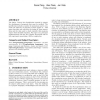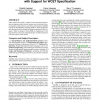138
click to vote
JTRES
2010
ACM
15 years 2 months ago
2010
ACM
Chip-multiprocessors offer increased processing power at a low cost. However, in order to use them for real-time systems, tasks have to be scheduled efficiently and predictably. I...
142
click to vote
JTRES
2010
ACM
15 years 2 months ago
2010
ACM
In order to guarantee that real-time systems meet their timing specification, static execution time bounds need to be calculated. Not considering execution time predictability led...
116
click to vote
JTRES
2010
ACM
15 years 2 months ago
2010
ACM
With traditional testing, the test case has no control over non-deterministic scheduling decisions, and thus errors dependent on scheduling are only found by pure chance. Java Pat...
158
click to vote
JTRES
2010
ACM
15 years 2 months ago
2010
ACM
We present oSCJ, an implementation of the draft of Safety Critical Java (SCJ) specification. SCJ is designed to make Java amenable to writing mission- and safety-critical software...
134
click to vote
JTRES
2010
ACM
15 years 2 months ago
2010
ACM
The Safety Critical Java Specification intends to support the development of programs that must be certified. The specification includes a number of annotations used to constrain ...
352
click to vote
JTRES
2010
ACM
15 years 2 months ago
2010
ACM
Safety-Critical Java (SCJ) is a dialect of Java that allows programmers to implement safety-critical systems, such as software to control airplanes, medical devices, and nuclear p...
140
click to vote
GECCO
2008
Springer
15 years 3 months ago
2008
Springer
New multimedia embedded applications are increasingly dynamic, and rely on Dynamically-allocated Data Types (DDTs) to store their data. The optimization of DDTs for each target em...
124
Voted
CSREAESA
2009
15 years 3 months ago
2009
: Space is a hazardous environment for both man and machine and to explore such a terrain a rugged, yet easily implementable, platform is needed. Low-cost, low-power embedded syste...
118
click to vote
ECRTS
2010
IEEE
15 years 3 months ago
2010
IEEE
Abstract--Limited preemption scheduling has been introduced as a viable alternative to non-preemptive and fullypreemptive scheduling when reduced blocking times need to coexist wit...
116
Voted
ECRTS
2010
IEEE
15 years 3 months ago
2010
IEEE
Modern real-time systems increasingly operate with multiple interactive applications. While these systems often require reliable quality of service (QoS) for the applications, eve...




